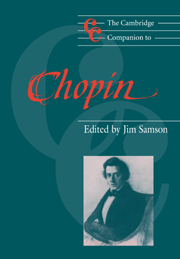Book contents
- Frontmatter
- Myth and reality: a biographical introduction
- PART 1 The growth of a style
- 1 Piano music and the public concert, 1800–1850
- 2 The nocturne: development of a new style
- 3 The twenty-seven etudes and their antecedents
- 4 Tonal architecture in the early music
- PART 2 Profiles of the music
- PART 3 Reception
- Appendix A historical survey of Chopin on disc
- Notes
- List of Chopin's work
- Bibliographical note
- Index
1 - Piano music and the public concert, 1800–1850
from PART 1 - The growth of a style
Published online by Cambridge University Press: 28 September 2011
- Frontmatter
- Myth and reality: a biographical introduction
- PART 1 The growth of a style
- 1 Piano music and the public concert, 1800–1850
- 2 The nocturne: development of a new style
- 3 The twenty-seven etudes and their antecedents
- 4 Tonal architecture in the early music
- PART 2 Profiles of the music
- PART 3 Reception
- Appendix A historical survey of Chopin on disc
- Notes
- List of Chopin's work
- Bibliographical note
- Index
Summary
In the late eighteenth and early nineteenth centuries the city of Vienna, long a prominent centre of European musical life, played a leading role in the development of pianos and of piano playing. Instruments from Viennese makers were sought throughout Europe, while aspiring pianists travelled there in order to study and to perform. The fact that it was with Vienna that pianists such as Mozart, Beethoven, Ries, Hummel, Moscheles and Kalkbrenner were associated gave substance to its confident claim to be die Heimat der Klavier-Virtuositdt. So when in August 1829 the nineteen-year-old Chopin gave two concerts in Vienna – the first performances of note which he gave outside his native Warsaw – the praise that Viennese critics accorded to his unusual talent was of no mean significance.
It was after the second of these concerts that a critic singled out Chopin as one pursuing a path of his own. This was not apparent, however, from the choice of repertoire, or from the circumstances surrounding the performances. There was nothing about the character of these concerts to differentiate them from other events of the season. Each took place in the Imperial Theatre, the Kärnthnerthor-theater, using the orchestral forces available; each consisted of a mixture of vocal and instrumental items for the first half of the programme, with a ballet to complete the evening's entertainment. In each programme Chopin performed twice, playing works of his own composition. The Variations on 'Lá ci darem' he performed on both occasions; for the second concert, the Rondo á la krakowiak replaced an improvisation on vocal themes.
- Type
- Chapter
- Information
- The Cambridge Companion to Chopin , pp. 9 - 31Publisher: Cambridge University PressPrint publication year: 1992
- 2
- Cited by

